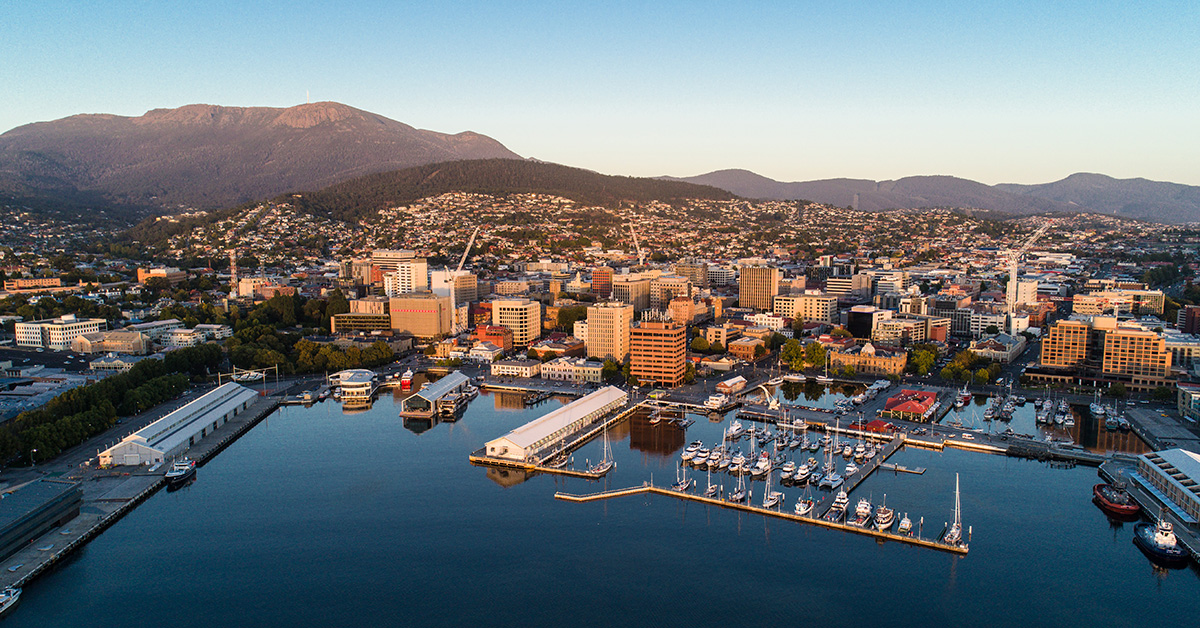Guide to Property Investing in Tasmania

In this day and age, there are countless ways and means to invest your money and watch it grow from a small acorn to a mighty oak. One of the most reliable of these is the property market, a stable option that promises steady growth, year-on-year. After all, folk are always going to need somewhere to live, and because of this sense of permanence and tangibility, it's of little surprise that the Tasmanian real estate market offers a great opportunity to those looking to invest.
However, it can be difficult to know where to start, especially in a field that can often seem daunting and complicated in equal measure. Never fear - at LJ Hooker, we're well-versed in all facets of investment property, so read on to find out precisely what you need to know.
Different kinds of investment property in Tasmania
Positive cashflow property
A positive cash flow property is one where rental income made from your investment is higher than that of the expense of running the home - including home loan and maintenance costs. The property runs at a profit, with a good rental yield.
Even so, when house values rise, rental yields contract. This can make it tougher establish positive cashflow when investing in property in Australia.
Negatively geared property
This term is roughly the opposite of positive cashflow - the property operates at a loss, because the interest on the home loan is higher than the rental income the rental income. However, there are benefits available in the form of tax deductions, making this method a popular choice with investors looking to make the most of capital gains.
Negatively geared property allows owners to operate their property at a short term loss, but this is mitigated by the tax breaks, producing long term gain.
Additionally, this method is popular in Tasmania because house prices continue to rise so quickly, especially in Hobart. Nevertheless, your investment strategy depends almost entirely on your income.
At LJ Hooker, our Home Loans team is available to help you understand each of these concepts, and lend advice on how best to move forward with you Tasmanian investment.
Financing a Tasmanian property investment
You may be surprised to hear that there are several ways to get you foot in the door of property investment in Tasmania, as well as how you can finance the move. It's even possible for those buying bricks and mortar for the first time to invest, as long as they live in their new home for at least six months, within 12 months of the final settlement. This will mean that they are still in line for the First Home Owner Grant (FHOG), which is designed to give first-time buyers a little help onto the ladder.
Another common way to invest in property in Tasmania is to leverage equity from an existing property purchase. In short, equity is the difference between the value of your home and the amount left owing on your mortgage. You can unlock this by refinancing your current home, and use it as capital for your next purchase. A big benefit of this method is that you aren't slowed down by having to save up for a deposit - always welcome!
If you're looking to borrow money to invest in Tasmanian property, LJ Hooker can help in this regard. Our Home Loans experts will talk you through each of your options, and we think that you'll find them highly agreeable. You'll be able to take advantage of our low rates and limited fees, as well as a whole host of other options, including free unlimited extra repayments and redraws, and up to four loan splits, amongst a raft of other features.
When looking to borrow with the intention of investing in mind, it can be good to weigh up the advantages and disadvantages of such a method. You can read up on the specific risks and rewards on this handy section of the MoneySmart website - take a look!
Finding the right Tasmanian investment property
When looking for property to invest in across Tasmania, the process isn't too far removed from purchasing your first house, or when you're looking to upsize/downsize. Even so, there are still certain aspects of the process that you'll need to look out for. For example, median value growth and and rental yield represent cash flow and capital gains respectively, meaning that they are of paramount importance when it comes to your investment strategy.
- To get a good grasp of market trends, which includes value increases and lending trends, be sure to point your browser in the direction of CoreLogic RP Data, domain.com.au and realestate.com.au - each are a valuable resource when hunting for a suitable investment property.
- For vacancy rates, as well as determining where tenant demand is both strong and weak, SQM Research's database is a good bet.
- Our real estate agents have an excellent market knowledge, and can readily alert you to investment properties best suited to your situation.
Even if you've bought property across Australia or even Tasmania before, you'll still need to do your homework when it comes buying property as an investment. You'll likely require the help of a financial planner, mortgage broker and solicitor - all will make the process of finding and buying a property that little bit easier.
The Law Society of Tasmania will help you find a solicitor, and you should also take a look at the state's Financial Planning Association to give you assistance regarding money matters. If you're trying to find, secure and pay for a perfect Tasmanian investment property, putting the right team into place could be key to your success!
Investment property taxes
Of course, when buying a property for investment in Tasmania, you need to budget for the fees and taxes that you'll incur. The most obvious place to figure out how much you'll owe is the State Revenue Office.
Stamp duty is perhaps the most obvious of these - every property buyer must pay, and it will have to be paid within three months of a transfer. To give you an idea, let's say your investment has a value of $250,000 - you'll owe a total of $7,935 in stamp duty. Take a look at the Tasmanian government's Property Transfer Duty Calculator, which will help you to figure out what your duty will be when purchasing investment property in Tasmania.
Land tax is another cost you'll have to stump up for. You'll have to pay as of July 1 each year and, as with stamp duty, it'll depend on the value of your investment property as to how much you owe. A house worth between $25,000 and $349,999 equates to a fee of $50, as well as 0.55 per cent of the value above $25,000. For houses worth $350,000 or more, a fee of $1,837 plus 1.5 per cent of the value above that threshold is applicable. Be sure to use the land tax calculator to get an idea of what you'll owe.
Additionally, it's worth bearing in mind that an investment home loan is likely have a higher interest rate than one for owner occupiers. Using a comparison website will help you to find the most suitable deal.
Tax benefits
Several of the costs that come with running a Tasmanian investment property can often be offset via tax deductions. This could include property management fees, repair costs, legal issues, and mortgage fees. The Australian Taxation Office has a full list of the tax deductions that can be made when you own rental property.
Managing your Tasmanian investment property
Do it yourself, or use an agent?
Once you've signed all the contracts, got finance in place and can officially call your new home your own, the next thing to do is to figure out how to manage it. Perhaps you see yourself as a budding landlord, which brings its own set of pros and cons. Of course, what you do with your investment is up to you, but have you considered employing a property managing agency? At LJ Hooker, our dedicated team of property managers will look after the nitty-gritty that comes with letting a house, leaving you to sit back and reap the rewards. Take a look at yet more reasons as to why you should think about letting us take care of your investment - we're sure you'll find the prospect pretty tempting!
If you're still thinking of going it alone, it's well worth having a read of Your Investment Property's guide to your rights and responsibilities as a landlord. Every little detail is covered here, such as the rules and regulations around rent and bond, right through to repairs, utilities and service charges, and your visitation rights - a must for any fledgling landlord.
Once you've taken everything into consideration, such as the time it might take with ongoing maintenance and other issues, you may well decide that you want to leave the hard work to property managers - which is when it's time to get in touch with LJ Hooker.
What should you ask a property manager?
There are several questions you should ask a property agent before signing them up - after all, this is your investment and a big source of your income, so you'll want to get it right first time.
- How many properties do they manage? How long have they been doing it?
- Do they do repairs themselves, or is a contractor called?
- How are tenants screened and selected?
- How are rental arrears resolved?
- What are the agent's fees, and what services does this cost include?
- Can you remain in regular contact with the agent?
Typically, there is an initial fee of between one and four weeks rent set by the property manager. An ongoing percentage of monthly rent is paid thereafter, usually 5 to 10 per cent.
Take a look at a few frequently asked questions when it comes to property management, from rent increases to the length of the lease. From a rental property management point of view, we'll take care of everything, from the tedious legal side of things, through to picking suitable tenants through our stringent screening process. This will help avoid any unwanted situations, such as an unreliable tenant, or that the rent will fall into arrears. We list a rental property every 35 seconds, which just shows how experienced LJ Hooker is when it comes to property management.
Disclaimer
The advice provided on this website is general advice only. It has been prepared without taking into account your personal objectives, financial situation or needs. While every care has been taken to ensure the accuracy of the information it contains, neither the publishers, authors nor their employees, can be held liable for inaccuracies, errors or omission. Readers are advised to contact their financial adviser, broker or accountant before making any investment decisions and should not rely on this article as a substitute for professional advice. This information is to be used as a guide only and is subject to change at any time. All information is current as at publication release and the publishers take no responsibility for any factors that may change thereafter.



